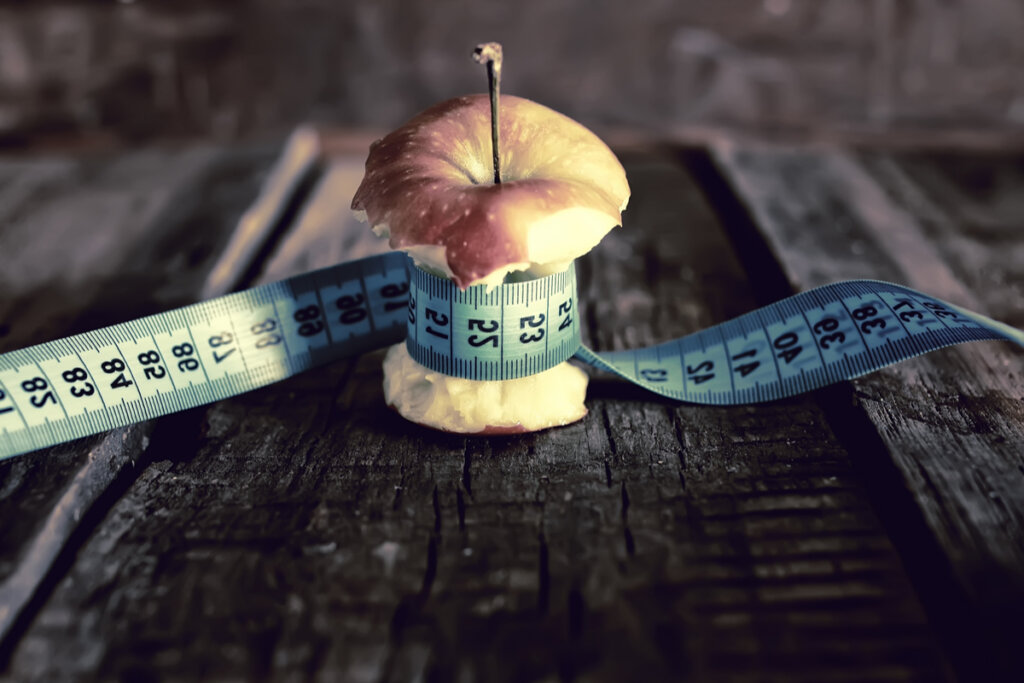Diet Culture: Its Psychological Consequences for Mental Health


Written and verified by the psychologist Cristina Roda Rivera
There are certain ideas that accompany us throughout life. One of them is undoubtedly diet culture. Indeed, being asked what we eat or how much we weigh are questions that can be as pervasive as knowing how much money we have, what we do, or how many children we want to have.
Diet culture is so ingrained in the Western world that attacking or dismantling it could bring down not only some of the world’s most powerful businesses, but also certain lifestyles and beauty ideals.
Beyond the fact of how harmful diet culture can be for the body, the field of mental health has also focused on the subject for many years. In fact, it’s often the first step toward the development of toxic eating behaviors.
Body harassment
You probably spend a great deal of time thinking about what your body’s like and how it could look better. Since you were little, you may well have been thinking about changing it so that it looks more like the ones you see in the media. You want to change it to make it ‘prettier’. That’s how the concept of diet becomes integrated into your life, in your need to look and feel better.
As you look at increasingly more messages that inspire rejection of your body and listen to weight loss advice that’s supposed to give you a better life, you may find yourself asking: Why do I think that certain changes in my body will make me happier? Also, why do you see such a clear relationship between weight and health yet take other variables, that are as important, out of the equation?

Diet culture doesn’t care about your health, it only cares about your weight
Diet culture, the disastrous ideal of a society that suffers from grossophobia has controlled you since childhood. In fact, both the pressure for thinness and the danger of eating disorders are almost exclusive issues for women. At least, they have been, until recently.
The idea of losing weight is everywhere. You feel obliged to go on a diet if you so much as gain a few extra kilos. However, it’s not for health but aesthetic reasons. In fact, being in control of your life is seen as linked to being in control of your weight.
However, included in all the speeches that advocate thinness as the epitome of beauty and health, those that you’ve accepted and even internalized for a long time, is the idea that you’re not in control. Nevertheless, your body speaks a far richer language than caloric math.
The less weight, more happiness message is so well maintained that we all believe in it. Indeed, it’s everywhere. In the cinema, on tv, in discussions, and in the words of your loved ones. Whether subliminal or explicit, this message is normalized and almost undeniable: To be beautiful, you have to be skinny!
Revealing the broken promises of diet culture
Diet culture fuels body shaming and body discrimination. It also encourages eating disorders. In fact, it instills the false belief that eating certain foods and living in a slimmer body increases your worth.
Existing research estimates that approximately one-third of the US population knows someone who’s experienced body shaming. In addition, about 85 percent of people consider fat shaming to be a serious problem. These statistics highlight the importance of counseling professionals committing to dismantling the diet culture.
The distorted lens places white cisgender women as the primary target of diet culture pressures and lies. That said, many other populations and individuals are also affected.
Let’s look at some of the main premises of the most widespread diet culture.
If you lose weight, you’ll be healthier, happier, and more successful
Most of the promises that diets make revolve around the above statement. If you don’t question the central promise of the diet, you might accept such lies, both for yourself and your social circle.
In most cases, diets fail when it comes to losing weight. Indeed, research suggests that 80 percent of diets fail in the long run.
Essentially, dieting harms your metabolism because your biology isn’t programmed to go into starvation mode. Furthermore, dieting increases the likelihood of binge eating which is the body’s way of saying, “Hey you! I’m starving here! Feed me now!”. Therefore, although diet culture claims otherwise, it’s important that we listen to our bodies.
Diets sculpt more harmonious bodies
Striving to conform to society’s representation of the ideal body shape and size increases the likelihood of developing body shaming. This is also linked to eating disorders or body dysmorphic disorder.
Eating disorders affect people of all body sizes, not only what we would consider ‘overweight’ bodies. They correlate negatively with measures of happiness and health.
As a matter of fact, eating disorders correlate with a multitude of adverse health outcomes. For example, gastrointestinal problems, menstrual irregularities, cardiac abnormalities, osteoporosis, oral/dental complications, and comorbid psychological disorders, among others.

Dismantling the diet culture
Given the harmful implications of diet culture, how can we start dismantling it? On the plus side, diet culture isn’t rooted in our biology. Like all aspects of culture, it’s learned, which means it can be unlearned.
This unlearning occurs differently in different people. After all, we all struggle with our identities, some of which give us privileges and some disadvantages in a world infected by diet culture.
Health doesn’t equate to one weight or another. All bodies are valid. However, if you want to lose weight you should go to a nutritionist but not specifically to lose weight, but so your body can, through how you nourish it, perform its vital functions better. To make you feel freer.
If people, and more especially women, weren’t continuous victims of their bodies, weight, skin, or size, they’d gain valuable time to dedicate to other interests.
The diet culture turns us all into bodies that only have value in their exposure to others. Most of the population falls into this trap. The one who doesn’t conform is happier, healthier, and more carefree. They’re also less prone to being ripped off.
All cited sources were thoroughly reviewed by our team to ensure their quality, reliability, currency, and validity. The bibliography of this article was considered reliable and of academic or scientific accuracy.
- Garner, D.M., Garner, M.V. & Van Egeren, L.F. (1992). Body dissatisfaction adjusted for weight: The body illusion index. International Jour – nal of Eating Disorders, 11, 263-271.
- Raich, R. M. (2011). Una perspectiva desde la psicología de la salud de la imagen corporal. Avances En Psicología Latinoamericana , 22(1), 15-27. Recuperado a partir de https://revistas.urosario.edu.co/index.php/apl/article/view/1261
This text is provided for informational purposes only and does not replace consultation with a professional. If in doubt, consult your specialist.








